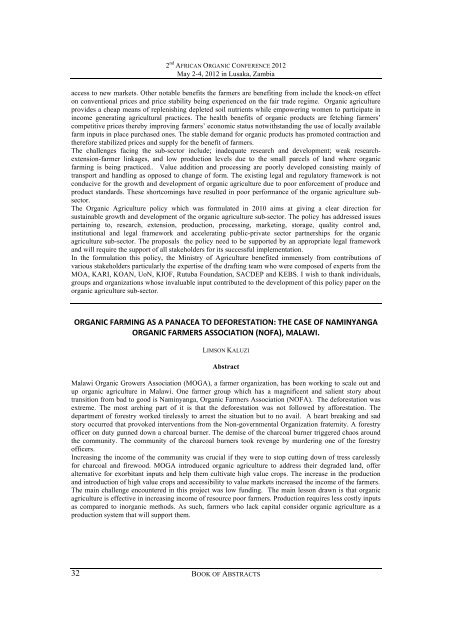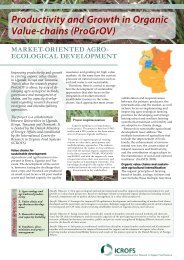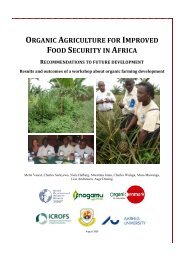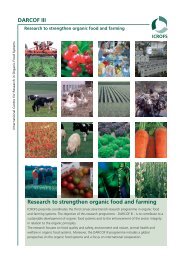The 2nd African Organic Conference â Mainstreaming ... - ICROFS
The 2nd African Organic Conference â Mainstreaming ... - ICROFS
The 2nd African Organic Conference â Mainstreaming ... - ICROFS
You also want an ePaper? Increase the reach of your titles
YUMPU automatically turns print PDFs into web optimized ePapers that Google loves.
2 nd AFRICAN ORGANIC CONFERENCE 2012<br />
May 2-4, 2012 in Lusaka, Zambia<br />
access to new markets. Other notable benefits the farmers are benefiting from include the knock-on effect<br />
on conventional prices and price stability being experienced on the fair trade regime. <strong>Organic</strong> agriculture<br />
provides a cheap means of replenishing depleted soil nutrients while empowering women to participate in<br />
income generating agricultural practices. <strong>The</strong> health benefits of organic products are fetching farmers’<br />
competitive prices thereby improving farmers’ economic status notwithstanding the use of locally available<br />
farm inputs in place purchased ones. <strong>The</strong> stable demand for organic products has promoted contraction and<br />
therefore stabilized prices and supply for the benefit of farmers.<br />
<strong>The</strong> challenges facing the sub-sector include; inadequate research and development; weak researchextension-farmer<br />
linkages, and low production levels due to the small parcels of land where organic<br />
farming is being practiced.. Value addition and processing are poorly developed consisting mainly of<br />
transport and handling as opposed to change of form. <strong>The</strong> existing legal and regulatory framework is not<br />
conducive for the growth and development of organic agriculture due to poor enforcement of produce and<br />
product standards. <strong>The</strong>se shortcomings have resulted in poor performance of the organic agriculture subsector.<br />
<strong>The</strong> <strong>Organic</strong> Agriculture policy which was formulated in 2010 aims at giving a clear direction for<br />
sustainable growth and development of the organic agriculture sub-sector. <strong>The</strong> policy has addressed issues<br />
pertaining to, research, extension, production, processing, marketing, storage, quality control and,<br />
institutional and legal framework and accelerating public-private sector partnerships for the organic<br />
agriculture sub-sector. <strong>The</strong> proposals the policy need to be supported by an appropriate legal framework<br />
and will require the support of all stakeholders for its successful implementation.<br />
In the formulation this policy, the Ministry of Agriculture benefited immensely from contributions of<br />
various stakeholders particularly the expertise of the drafting team who were composed of experts from the<br />
MOA, KARI, KOAN, UoN, KIOF, Rutuba Foundation, SACDEP and KEBS. I wish to thank individuals,<br />
groups and organizations whose invaluable input contributed to the development of this policy paper on the<br />
organic agriculture sub-sector.<br />
ORGANIC&FARMING&AS&A&PANACEA&TO&DEFORESTATION:&THE&CASE&OF&NAMINYANGA&<br />
ORGANIC&FARMERS&ASSOCIATION&(NOFA),&MALAWI.&<br />
LIMSON KALUZI<br />
Abstract<br />
Malawi <strong>Organic</strong> Growers Association (MOGA), a farmer organization, has been working to scale out and<br />
up organic agriculture in Malawi. One farmer group which has a magnificent and salient story about<br />
transition from bad to good is Naminyanga, <strong>Organic</strong> Farmers Association (NOFA). <strong>The</strong> deforestation was<br />
extreme. <strong>The</strong> most arching part of it is that the deforestation was not followed by afforestation. <strong>The</strong><br />
department of forestry worked tirelessly to arrest the situation but to no avail. A heart breaking and sad<br />
story occurred that provoked interventions from the Non-governmental Organization fraternity. A forestry<br />
officer on duty gunned down a charcoal burner. <strong>The</strong> demise of the charcoal burner triggered chaos around<br />
the community. <strong>The</strong> community of the charcoal burners took revenge by murdering one of the forestry<br />
officers.<br />
Increasing the income of the community was crucial if they were to stop cutting down of tress carelessly<br />
for charcoal and firewood. MOGA introduced organic agriculture to address their degraded land, offer<br />
alternative for exorbitant inputs and help them cultivate high value crops. <strong>The</strong> increase in the production<br />
and introduction of high value crops and accessibility to value markets increased the income of the farmers.<br />
<strong>The</strong> main challenge encountered in this project was low funding. <strong>The</strong> main lesson drawn is that organic<br />
agriculture is effective in increasing income of resource poor farmers. Production requires less costly inputs<br />
as compared to inorganic methods. As such, farmers who lack capital consider organic agriculture as a<br />
production system that will support them.<br />
32<br />
BOOK OF ABSTRACTS





